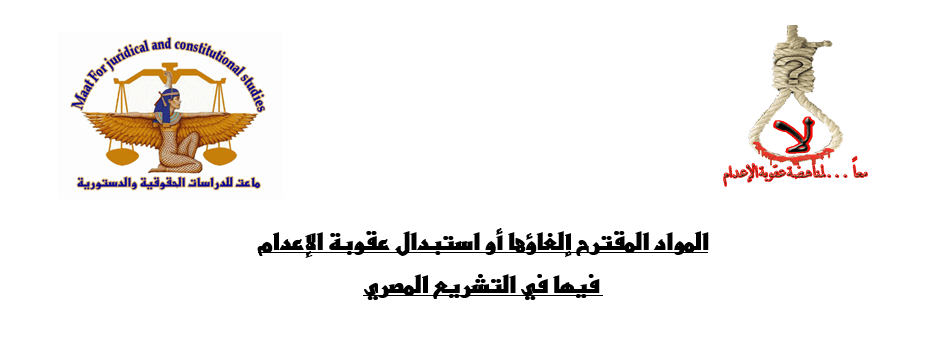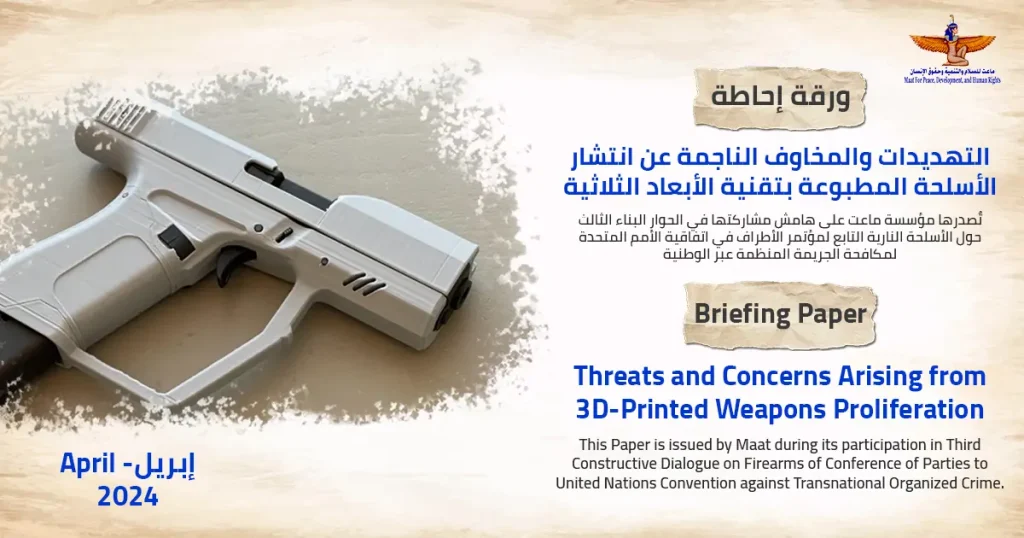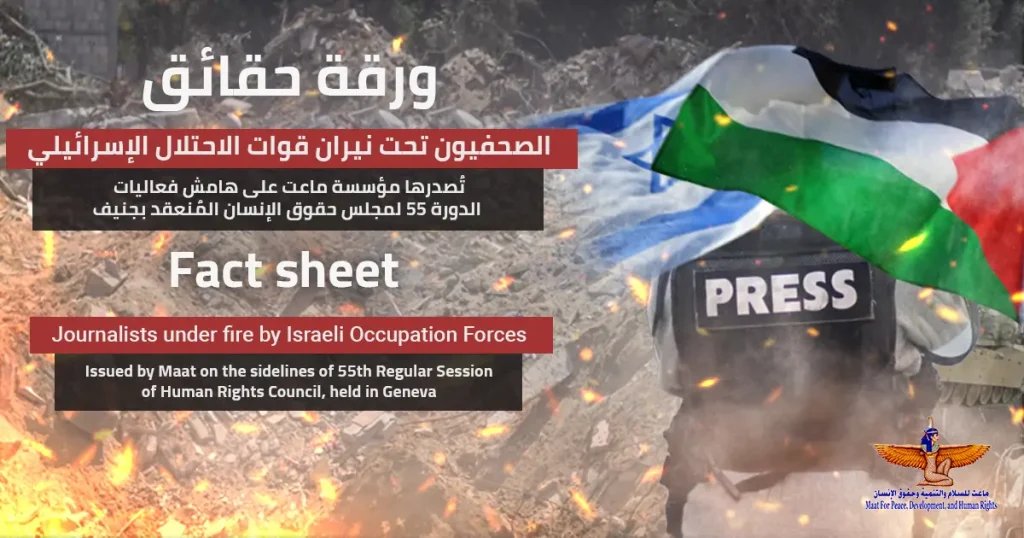Articles proposed to abolish or replace the death penalty
Where in the Egyptian legislation
The Maat Center for Legal and Constitutional Studies believes that it is necessary to redraw the legislative policy on the death penalty, and this is within the framework of adopting the principle of rationalizing the text on it in line with what is stated in the international conventions ratified by Egypt and in recognition of the extent of its cruelty and its contact with the most important human rights, namely the right to life.
Texts that represent insults to the right to life in the Egyptian Penal Code can be monitored in their overriding formulation in the following articles:
1- Article 86 bis (a)
(The penalty for the crime stipulated in the first paragraph of the previous article shall be death or life imprisonment if terrorism is one of the means used in achieving or implementing the purposes called for by the association, body, organization, group, or gang mentioned in this paragraph, and whoever extends it shall be punished by the same penalty. With weapons, ammunition, explosives, tasks, machines, money, or information, with his knowledge of what it calls for and its means to investigate or implement that The penalty for the crime stipulated in the second paragraph of the previous article shall be temporary hard labor if terrorism is one of the means used in the investigation or execution of the purposes. To which the association, body, organization, group or gang mentioned in this paragraph is called if the perpetrator is a member of the armed forces or the police and the penalty for the crime stipulated in the third paragraph of the previous article is imprisonment for a period not exceeding ten years if the group or gang mentioned in The previous article uses terrorism to achieve the purposes it calls for, or the promotion or recruitment was within the places of worship or places of the armed forces or the police or between their members)
The previous article was added to Law No. 97 of 1992.
2- Article 86 bis (b)
(Any member of one of the associations, corporations, organizations, groups, or gangs mentioned in Article 86 bis shall be punished with life imprisonment to force a person to join any of them or prevent him from separating from them. The penalty shall be death if the offender's act results in the death of the victim.) .
3- Article (87)
(Permanent or temporary imprisonment shall be inflicted on whoever attempts by force to overthrow the state’s constitution, republican system, or the form of government. If the crime is committed by an armed gang, he shall be punished with death by a thousand gangs, as well as whoever assumes its leadership or assumes some leadership in it. "
(Amended by Law No. 112 of 1957).
4- Article (89)
(Capital punishment shall be the penalty inflicted on whoever forms a gang that attacks a group of the population or resists with arms the men of the public authorities in implementing the laws. Likewise, whoever assumes the leadership of such a gang or assumes some leadership in it. As for whoever joins that gang and does not participate in its formation and does not assume leadership in it. He shall not be punished with life or temporary imprisonment.)
5- Article (90)
(Imprisonment for a period not exceeding five years shall be the penalty inflicted on whoever deliberately destroys buildings or public property or designated for governmental interests, public facilities, public institutions, or legally recognized associations of public benefit. The penalty shall be life imprisonment or temporary hard labor if the crime occurs during a time of turmoil or sedition. With the intention of causing terror among people or spreading chaos, the penalty shall be death if the crime results in the death of a person who was present in those places. The perpetrator shall in all cases pay the value of the things he destroyed.
The maximum penalty stipulated in the first paragraph of Article (90) shall be doubled if the crime is committed in execution of a terrorist purpose.
6- Article (90 bis):
(Permanent or temporary imprisonment shall be the penalty inflicted on whoever attempts by force to occupy something from public buildings or those designated for governmental interests, public facilities, or institutions of public benefit. If the crime is committed by an armed gang, capital punishment shall be imposed on whoever formed the gang, as well as who assumed its leadership or assumed some leadership in it.)
7- Article (91)
(Whoever assumes for a criminal purpose the command of a division, a section of the army, a section of the fleet, a warship, a warship, a military post, a port, or a city without a government mandate or without a legitimate reason, and whoever continues despite the order issued to him shall be punished with death. Of the government in a military command, whatever it is, and every force chief who kept his troops under arms (or together) after the government issued an order to dismiss them)
8- According to Article 92
(A person who has the right to order members of the armed forces or police shall be punished with temporary imprisonment, who asks them or assigns them to work to disrupt government orders if that is for a criminal purpose. If the crime results in obstructing the implementation of government orders, the penalty shall be death or life imprisonment, or without him from the military chiefs. Or their pimps who obeyed are punished with hard labor.)
9- Article (93)
(Capital punishment shall be the penalty inflicted on whoever conferred himself heading a gang carrying weapons or assumed command therein with the intention of usurping or plundering lands or funds owned by the government or a group of people or resisting the military force charged with chasing the perpetrators of these felonies. ).
10- Article 88
(Temporary hard labor shall be the penalty inflicted on whoever hijacks a means of transportation by air, land or water, endangering the safety of its occupants, and the penalty shall be life imprisonment, if the perpetrator uses terrorism or the aforementioned act results in wounds from those stipulated in Articles 241 and 240 of this law to any A person who was inside or outside the facility, or if the perpetrator resisted by force or violence the public authorities while performing their duty to restore the means from his control, and the penalty shall be death if the act results in the death of a person inside or outside the facility)
11- Article 88 bis (A)
Without prejudice to any more severe penalty, whoever transgresses one of those in charge of implementing the provisions of this section shall be punished with temporary imprisonment as a result of this execution, or resists him by force or violence, or by threatening to use them with him during or because of the performance of his duty. Resistance is a permanent disability, or if the perpetrator carries a weapon or kidnapped or detained any of those responsible for implementing the provisions of this section, he, his spouse, or one of his ascendants or descendants. The penalty shall be death if the assault or resistance results in the death of the victim.
12-Article 88 bis (a)
Without prejudice to any more severe penalty, whoever transgresses one of those in charge of implementing the provisions of this section shall be punished with temporary imprisonment as a result of this execution, or resists him by force or violence, or by threatening to use them with him during or because of the performance of his duty. Resistance is a permanent disability, or if the perpetrator carries a weapon or kidnapped or detained any of those responsible for implementing the provisions of this section, he, his spouse, or one of his ascendants or descendants. The penalty shall be death if the assault or resistance results in the death of the victim.
13 Article 102 (c)
(A life sentence shall be imposed on whoever uses or attempts to use explosives in a manner that endangers people's lives. If the explosion causes the death of one or more persons, the penalty shall be death.)
14- Article (26):
(A penalty of imprisonment and a fine not exceeding five hundred Egyptian pounds shall be inflicted on whoever possesses or acquires himself or through an intermediary without a license of one of the weapons stipulated in Table No. 2 attached hereto.
Temporary imprisonment shall be the penalty inflicted on whoever possesses or possesses, personally or through an intermediary, without a license a weapon of the weapons stipulated in Part One of attached Schedule (3).
Life imprisonment shall be the penalty if the perpetrator possesses or possesses, personally or through an intermediary, a weapon of the weapons stipulated in Section Two of Schedule No. (3).
Article 17 of the Penal Code may not be applied in relation to the penalties stipulated in the previous three paragraphs if the perpetrator is one of the persons mentioned in clauses b to f of Article M (7).
Whoever possesses or acquires personally or through an intermediary ammunition that is used in the weapons stipulated in tables (3.2) shall be punished with imprisonment and a fine not exceeding fifty pounds.
The punishment shall be temporary imprisonment if the perpetrator is one of the persons mentioned in clauses b to f of Article 17 of this law.
Without prejudice to the provisions of Chapter Two bis of the Penal Code, the penalty shall be temporary or life imprisonment for anyone who possesses or acquires himself or through an intermediary without a license from one of the weapons stipulated in Article 1 of this law or ammunition that is used in the aforementioned weapons or explosives in one of the places. Gatherings, public transportation or places of worship,
Capital punishment shall be the penalty if the possession or possession of these weapons, ammunition, or explosives is intended to be used in any activity that violates public security or public order or with the intent to prejudice the system of government, the principles of the constitution, the basic systems of the social body, national unity, or social peace).
15-Article (34)
(He shall be punished with death or imprisonment for support and a fine of not less than one hundred thousand pounds and not exceeding five hundred thousand pounds
(A) Whoever possesses, acquires, purchases, sells, delivers, transfers, or offers to abuse substance a narcotic and that was with the intention of trading or trafficked in any form, except in the cases authorized by law.
(B) Anyone licensed to possess substance narcotic for use in a specific purpose and disposes of it in any form other than this purpose.
(C) Whoever manages or prepares a place for the abuse of narcotic essences for a fee.
The punishment for the crimes stipulated in this Article shall be the death penalty and a fine of not less than one hundred thousand pounds and not exceeding five hundred thousand pounds in the following cases:
- If the perpetrator uses in committing any of these crimes a person who has not reached the age of twenty-one years of age, or uses any of his ascendants, descendants, spouses, or anyone who is responsible for their upbringing or observation or who has effective authority over them in their supervision or direction.
- If the perpetrator is a public employee or employee assigned to implement the provisions of this law, or who is entrusted with combating drugs or controlling their circulation or possession, or if he has contact with them in any way)
- If the perpetrator abuses in committing it or facilitating the authority vested in him by virtue of his position, work, or immunity established for him in accordance with the constitution or the law.
- If the crime occurred in one of the places of worship, educational homes and their service facilities, clubs, public parks, places of treatment, social or penal institutions, camps or prisons, or in the immediate vicinity of these places.
- If the perpetrator provided the substance of the narcotic, delivered it, or sold it to a person under the age of twenty-one years of age, or pushed him to use it by any means of coercion, fraud, incitement, enticement, or facilitation.
- If the narcotic substance is the subject of the crime of cocaine or heroin or any of the substances mentioned in the first section of attached Schedule (1).
- If the perpetrator was previously convicted of one of the felonies stipulated in this article or the previous article.











